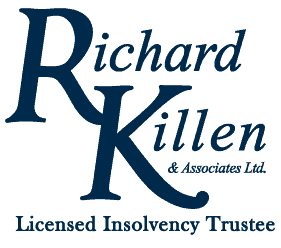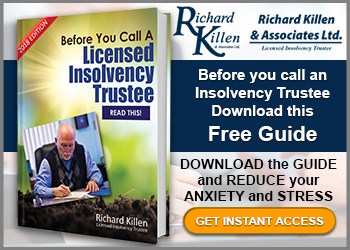- WHAT IS PERSONAL BANKRUPTCY?
- WHAT IS A BANKRUPTCY TRUSTEE?
- WILL BANKRUPTCY ELIMINATE ALL MY DEBTS?
- WILL LOSE MY HOME IF I FILE BANKRUPTCY?
- WHAT HAPPENS TO MY CAR IF I FILE BANKRUPTCY?
- HOW ARE TAX REFUNDS AFFECTED IN A BANKRUPTCY?
- WHAT CAN I KEEP IF I FILE BANKRUPTCY?
- WILL I LOSE MY JOB FOR FILING A BANKRUPTCY?
- WHAT HAPPENS TO MY WAGES IN A BANKRUPTCY?
- ARE THERE ALTERNATIVES TO BANKRUPTCY?
- HOW TO DECLARE PERSONAL BANKRUPTCY?
- HOW LONG DOES BANKRUPTCY LAST?
- DO I NEED TO FILE BANKRUPTCY?
- PERSONAL BANKRUPTCY HELP
Personal Bankruptcy Help and What Is A Bankruptcy Trustee
We get a lot of questions regarding personal bankruptcy advice or assistance as well as what is a bankruptcy trustee and how they can offer assistance. As a Toronto bankruptcy firm licensed to file bankruptcies by the Canadian government, Richard Killen & Associates has been helping individuals find debt relief and become debt-free since 1992. We understand very well how overwhelming personal bankruptcy can be. You will likely want to know how the process works and how declaring bankruptcy will affect you and your family, but these questions don’t have to overwhelm you.
We’ll get you some answers to commonly asked questions. Below is some general information about the process that you should know before deciding to declare bankruptcy in Canada. It will provide you with a basic explanation of what happens if you file and help you be aware of your rights and options.
If you don’t see answers to your questions below, please feel free to contact us anytime or you can raise these questions during your free consultation with your LIT.

WHAT IS PERSONAL BANKRUPTCY?
Personal bankruptcy is designed to help an insolvent person who has no other way to meet financial obligations to obtain a fresh financial start and end their overwhelming debt problems.
An important feature is the automatic “stay of proceedings” which takes effect as soon as you file for bankruptcy. The “stay” prevents your creditors from continuing any legal actions against you, it ensures that wage garnishments, harassing phone calls, and any court orders for collection activities against you are immediately stopped and discontinued.
WHAT IS A BANKRUPTCY TRUSTEE?
A bankruptcy trustee, now called a Licensed Insolvency Trustee or LIT, is a professional licensed by the Office of the Superintendent of Bankruptcy to administer bankruptcies and consumer proposals under the Bankruptcy and Insolvency Act. Only a licensed bankruptcy trustee or licensed insolvency trustee can file a bankruptcy or proposal for you.
In addition to being a bankruptcy administrator or a consumer proposal administrator, a LIT is also a qualified debt advisor and can provide unbiased advice about your financial problems and whether your situation is severe enough to warrant going bankrupt
WILL BANKRUPTCY ELIMINATE ALL MY DEBTS?
The concept of personal bankruptcy is relatively simple: You surrender your assets in exchange for the elimination of your debts. However, there are exemptions on certain assets that can mean you don’t lose all your assets and there are also certain exceptions on some debts that mean they cannot be eliminated through personal bankruptcy.
Bankruptcy will eliminate most unsecured debts, including:
- Credit card balances
- Lines of credit (if unsecured)
- Personal loans (if unsecured)
- Personal income tax debts, HST, and other tax debts
- Unpaid utility bills
- Medical bills
- Payday loans
- Past-due Insurance premiums
- Retail store accounts
- Student loan debts that are more than 7 years old
Exceptions include these unsecured debts which cannot be eliminated in bankruptcy:
- Student loans and apprentice loans less than 7 years old
- Child and spousal support
- Fines and most court-ordered restitution payments
- Court-awarded damages for sexual assault or intentionally inflicting bodily harm
- Debts as a result of fraud, embezzlement, or misappropriation
- Certain government overpayment debt
WILL LOSE MY HOME IF I FILE FOR BANKRUPTCY?
Whether you can keep your home will depend on 2 things:
- How much equity is in your home, and
- If you can afford to keep paying your mortgage payments.
Bankruptcy law in Canada requires you to use the equity on your home to pay off some of the money you owe to your creditors. That said, if you’ve already paid off a large portion of your mortgage and you’ve built up substantial equity in your home, filing might not be the best option to take. This is because you would need to pay your trustee the amount of non-exempt equity you have to keep your home. Non-exempt equity is the amount of home equity you have minus any provincial exemptions. In this case, you could file a consumer proposal as an alternative to bankruptcy. Generally speaking, however, we can say that in most cases there are options to keep the home and very few people who file in Canada actually lose their homes.
There are other factors to consider and each case is unique, it is best to speak to a local trustee (now called a licensed insolvency trustee or LIT) to determine your options for keeping your home.
WHAT HAPPENS TO MY CAR IF I FILE FOR BANKRUPTCY?
- If you have a car loan, it is considered a secured debt, and any asset tied to a secured debt is exempt from seizure. In this case, you can keep the car as long as you can continue making your car loan payments.
- If you fully own the car, you can keep it as long the vehicle’s value is not more than the allowed maximum exemption limit in your province.
- You can only keep one motor vehicle up to $6,600 in value.
If you have multiple vehicles, it is best to speak to your licensed insolvency trustee about your options to retain other vehicles.
HOW ARE TAX REFUNDS AFFECTED IN A BANKRUPTCY?
Income tax refunds are considered as assets. Generally speaking, you can lose any tax refunds owing to you up to the year you file bankruptcy or from previous years where you haven’t filed your taxes. This will be sent by the CRA to your trustee as an asset of your bankruptcy estate and will be distributed accordingly to your creditors. Moreover, you can keep tax refunds due to you after the year you filed. If you are expecting a tax refund, it is prudent to consult with a LIT about when to file as this can lead to special considerations.
WHAT CAN I KEEP IF I FILE FOR BANKRUPTCY?
Contrary to what most people fear, you will not lose everything when you file for bankruptcy in Canada. Certain assets are exempt from seizure depending on the province you live in. It’s important to know that the government has set provincial exemptions high enough that most people do not lose anything unless they have assets of extraordinary value.
In the Greater Toronto Area, allowable exemptions include:
- All personal clothing, food, fuel
- Household furniture and appliances up to $6,000
- One car no more than $6,600.00 in net value
- Tools of the trade needed for your work or business up to $11,300 in value
- Home Equity no more than $10,000.00
- RRSP, RRIF, and DPSP (Deferred Profit Sharing Plan) savings except for contributions made in the last 12 months
WILL I LOSE MY JOB FOR FILING FOR BANKRUPTCY?
The short answer is no since it is illegal in Canada for an employer to terminate employment simply for filing for bankruptcy. However, there are some professions, particularly those that adhere to a Code of Ethics and Standards of Professional Conduct that will require a bankrupt person to disclose if they are bankrupt. These are usually professions that involve the management of money and trust accounts such as insurance brokers, investment brokers, lawyers, or accountants.
It’s always important to check with your trustee if you are facing employment challenges due to filing and find out if there are options that can remedy such restrictions.
WHAT HAPPENS TO MY WAGES IN A BANKRUPTCY?
You get to keep your wages during the process. However, you will have to submit proof of income and expenses every month to your trustee which will be used to determine if you will be required to pay “surplus income.” If you earn more than the standard income threshold prescribed by law for a bankrupt person, you will have to make surplus income payments during the process. The principle is that the more income you have, then the more you can afford to repay to your creditors. If your wages are being garnished, bankruptcy will stop the wage garnishments.
ARE THERE ALTERNATIVES TO BANKRUPTCY?
Yes, many other avenues can be considered for your debt problems.
Some debt relief solutions include:
- Budgeting and credit counselling
- Debt consolidation loans
- Debt management plans
- Consumer proposals
- Bankruptcy
Declaring bankruptcy is usually seen as a last resort, that is when all other options have been explored. A LIT will explain every option that can likely help to reduce your debts and help you avoid bankruptcy. If it is determined that your debt problems can be solved with credit counselling or a debt consolidation loan, our bankruptcy office will refer you to a reputable local professional in your community.
HOW TO DECLARE PERSONAL BANKRUPTCY?
Personal bankruptcy is a legal process governed by federal legislation under the Bankruptcy & Insolvency Act. The major steps in the process are:
1st – Meet with a licensed insolvency trustee to evaluate your financial situation
This step includes a review of your assets, debts and household expenses and a discussion of all your options. At this point, the trustee will show you a comparison of your payments across several debt reduction programs based on your debt levels including debt consolidation, credit counselling, a consumer proposal as well as the option of personal bankruptcy.
2nd – File an assignment in bankruptcy with the OSB
Your trustee prepares the Assignment in Bankruptcy for you to sign to indicate that you are voluntarily filing for bankruptcy. The Assignment is filed with the OSB, which in turn issues a Certificate of Appointment to the trustee. At this point, you are legally bankrupt. You will have to surrender your assets to your trustee, the automatic stay of proceedings takes effect, and you will be required to complete certain duties as a bankrupt individual.
3rd – Attend two financial counselling sessions
You must complete consumer bankruptcy counselling with your trustee during your bankruptcy and before your discharge. Your trustee will usually discuss issues on what caused your bankruptcy and will also provide information on money management and ways in which you can rebuild your credit to equip you to start fresh financially when you get discharged.
4th – Meet with the trustee to discuss your discharge
Your trustee will let you know if there are creditors that will oppose your discharge and advise you on how to proceed. If all goes well and no one objects to your discharge, your bankruptcy ends upon completion of your obligations, your debts are eliminated and you’ll be debt-free.
HOW LONG DOES BANKRUPTCY LAST?
- For a first-time – automatic discharge after 9 months and up to 21 months if you have surplus income
- For a second time – 24 months to 36 months
DO I NEED TO FILE FOR BANKRUPTCY?
To help you find out if you need to file, you will need to consult with a Licensed Personal Bankruptcy Trustee.
An LIT will look at your income, assets, and debts give you an honest assessment of your financial situation, and help you determine if filing is right for you or whether you have other options.
Generally, there are common signs of money problems that warn you to take action:
- You have missed one or more payments on a mortgage or other loans.
- Your credit cards are maxed out and you are barely making minimum payments or have skipped monthly payments.
- You are taking out credit card cash advances or other high-interest loans to pay off multiple debts.
- Your debts are delinquent and you are getting harassing phone calls from collection agencies
- You have received notice of legal action against you to collect the money you owe.
If your debts are piling up and you are struggling to keep up with minimum payments, it’s important to seek help right away to find out your options. Once you know all your options and have weighed in on how each option will impact you and your family, you will have to finally decide whether bankruptcy is right for you. The decision is completely up to you to make, but your trustee can provide all the information you need and as much advice and guidance as you need to make the best decision.
Personal Bankruptcy Help
The bankruptcy office of Richard Killen & Associates offers bankruptcy trustees who can provide you with the help you need to achieve debt relief. We will explore the options that are available to you and find the best solution that will work for your unique financial situation. Give us a call and request a free consultation for personal bankruptcy assistance and also to understand what is a bankruptcy trustee and why they can offer you debt relief options that other debt consultants cannot.










